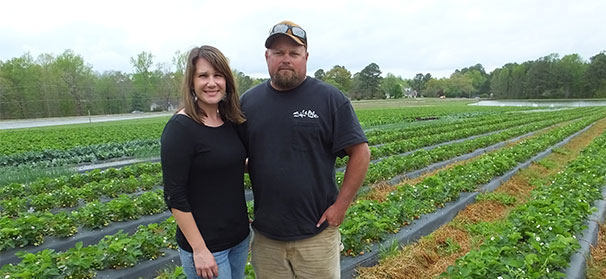

Jun 19, 2014Farm finds u-pick strawberry niche
When the economy changed a few years ago, Darin and Jessica Jones decided to get out of the residential grading and hauling business and into farming. It was a big leap, but the couple wasn’t new to agriculture. Darin grew up on a tobacco farm and Jessica’s grandfather was a farmer. They also had a large garden.
“I enjoyed farming,” Darin said. “I was raised around it. That’s why I went back to it.”
They also got a lot of helpful advice from their friends at Porter Farms & Nursery and the North Carolina Strawberry Association – advice that helped them avoid making major mistakes. Darin and Jessica chose strawberries as their main crop, found a plot of land on the outskirts of Raleigh, North Carolina’s capital, and started DJ’s Berry Patch. The farm is now a successful u-pick and agritourism operation, and the Joneses feel like they’re getting the hang of this farming thing.
“If we had tried to do it all on our own, it would have been tough to figure out,” Darin said.
They planted 3.5 acres of strawberries initially and about an acre of other crops, including tomatoes, cucumbers, squash, peppers, lettuce, cabbage, okra, sweet corn, melons, cantaloupes, beans, peas and pumpkins. Their plantings have expanded to 4.5 acres of strawberries and 3 acres of other produce. Most of the crops are grown at the main farm in Apex, near Raleigh, but because space is limited there some crops are grown at their home in Willow Springs, about 30 minutes from the main farm. They grow their pre-pick pumpkins at home and bring them to Apex for sale.
Strawberries are still the main moneymaker. They went with u-pick when they saw the growing popularity of agritourism.
“People want to come out and pick,” Darin said. “They want to bring their family out for a good time.”
Most of their customers come from the greater Raleigh area, especially Apex and nearby Cary.
Sales have been good, especially on weekends. They sell u-pick and pre-pick berries by the bucket. They charge $13 for a 5-pound bucket of pre-picked strawberries, $11 for a u-pick bucket. They sell a little bit wholesale, but try to sell as much as possible retail. They also sell at four farmers’ markets on Saturdays and some Wednesdays, Darin said.
Farming is a full-time job for Darin and Jessica – more than full-time during strawberry season, when they’re open 8 a.m. to 7 p.m. Mondays through Saturdays, 11 a.m. to 7 p.m. on Sundays. During summer produce season, they “cut back” by closing at 6 p.m. The farm is open from the beginning of strawberry season (some time in April) until Oct. 31. They’re usually done with strawberries by the second week of June.
“They come and go pretty fast,” Darin said. “It’s a lot of money to get back in a short amount of time.”
To keep up on busy Saturdays, there’s often up to 14 employees picking. They hire five H-2A workers (and sometimes additional H-2A workers from nearby tobacco farms) and two local women to pick. There’s also two to four people working the on-farm stand at a time, Darin said.
Besides fruit and vegetables, they sell their own mums. They also sell honey (courtesy of a local beekeeper), jellies (made with their own strawberries) and ice cream from Maple View Farm (which also uses their strawberries). A local processing company puts their strawberries in dressings, jams and jellies, Jessica said.
The Camarosa strawberries – big, dark-red and sweet – are popular, but they have to be picked at the right time.
“We don’t let people pick the Camarosas much, because they might not pick them red enough,” Jessica said. “They have to be super red.”
Chandlers are sweet, but don’t last as long. They must be eaten quickly, she said. They also grow Sweet Charlies.
The unusually cold winter of 2013-14 was tough on the strawberries. The stand and u-pick operation are typically open by the middle of April, but by that time this year the Joneses had just barely started picking early berries. They were hoping to be fully open by the end of April, Jessica said.
Their Apex farm borders some houses, but no neighbor has ever complained about the farm’s activities, such as spraying or noise from nighttime frost protection.
“That was one of my main concerns,” Darin said, but “we get along with all of them. They all come out and buy berries from us.”
Jessica, who hosts school and other group tours, would like to explore more agritourism opportunities in the future. And they’d both like to find a crop customers can pick between strawberries and pumpkins, something that would extend their u-pick season. That way they’d have a u-pick crop in spring, summer and fall.
Blueberries have potential as a summer u-pick crop, but space is limited at the Apex farm.
“We would love to have blueberries, but where do you put them?” Jessica asked.
Besides, they might have to plant an additional acre of strawberries in the future, to keep up with all the demand, Darin said.














